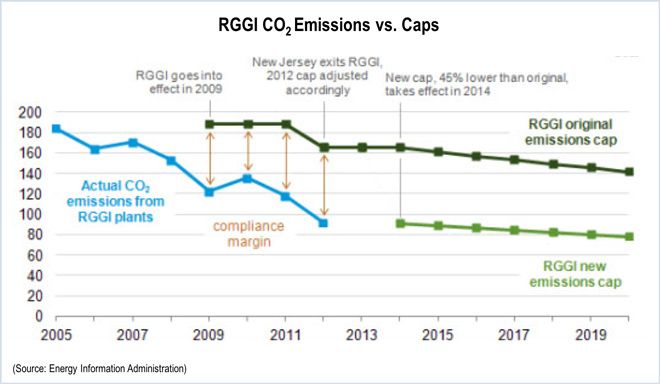By William Opalka
The Regional Greenhouse Gas Initiative provides substantial economic benefits and has not raised prices or impaired reliability, according to an independent study released at a meeting of state regulators last week.

“Based on an analysis of years of hard data, RGGI shows that multi-state, market-based carbon control mechanisms work and can deliver positive economic benefits,” Analysis Group Vice President Paul Hibbard said. “That’s not to say programs designed to cut greenhouse gas emissions are economic development programs — their goals are different. But the data clearly show that cutting carbon emissions can be a net positive for the economy.”
The report’s authors said the findings “provide valuable lessons for states” preparing for the Environmental Protection Agency’s proposed Clean Power Plan. The report was released last Tuesday at the summer meeting of the National Association of Regulatory Utility Commissioners in New York.
RGGI regulates carbon emissions from power plants in the six New England states, New York, Maryland and Delaware. The states have received about $2 billion in auction proceeds over its existence, investing those funds in energy efficiency programs, low-income assistance and clean energy development.
The report said initial costs are more than recovered in customer savings. “Although CO2 allowances tend to raise electricity prices in the near term, there is also a lowering of prices over time primarily because the states invest so much of the allowance proceeds on energy efficiency programs,” the report said.
The region also cut annual carbon emissions by about a third, from 140 million metric tons in 2008 to 90 million tons in 2014, according to the report. RGGI also reduced dollars used to pay for fossil fuels imported from outside the region by more than $1.27 billion in 2012-2014.
“The implementation of RGGI over six years has not adversely affected power system reliability in New England, New York or PJM. The pricing of carbon in Northeast and Mid-Atlantic electricity markets has been seamless from an operational point of view and successful from the perspective of efficient pricing of emission control in regional markets,” the report said.
The report was funded the Barr Foundation, the Energy Foundation, the Thomas W. Haas Foundation and the Merck Family Fund.


